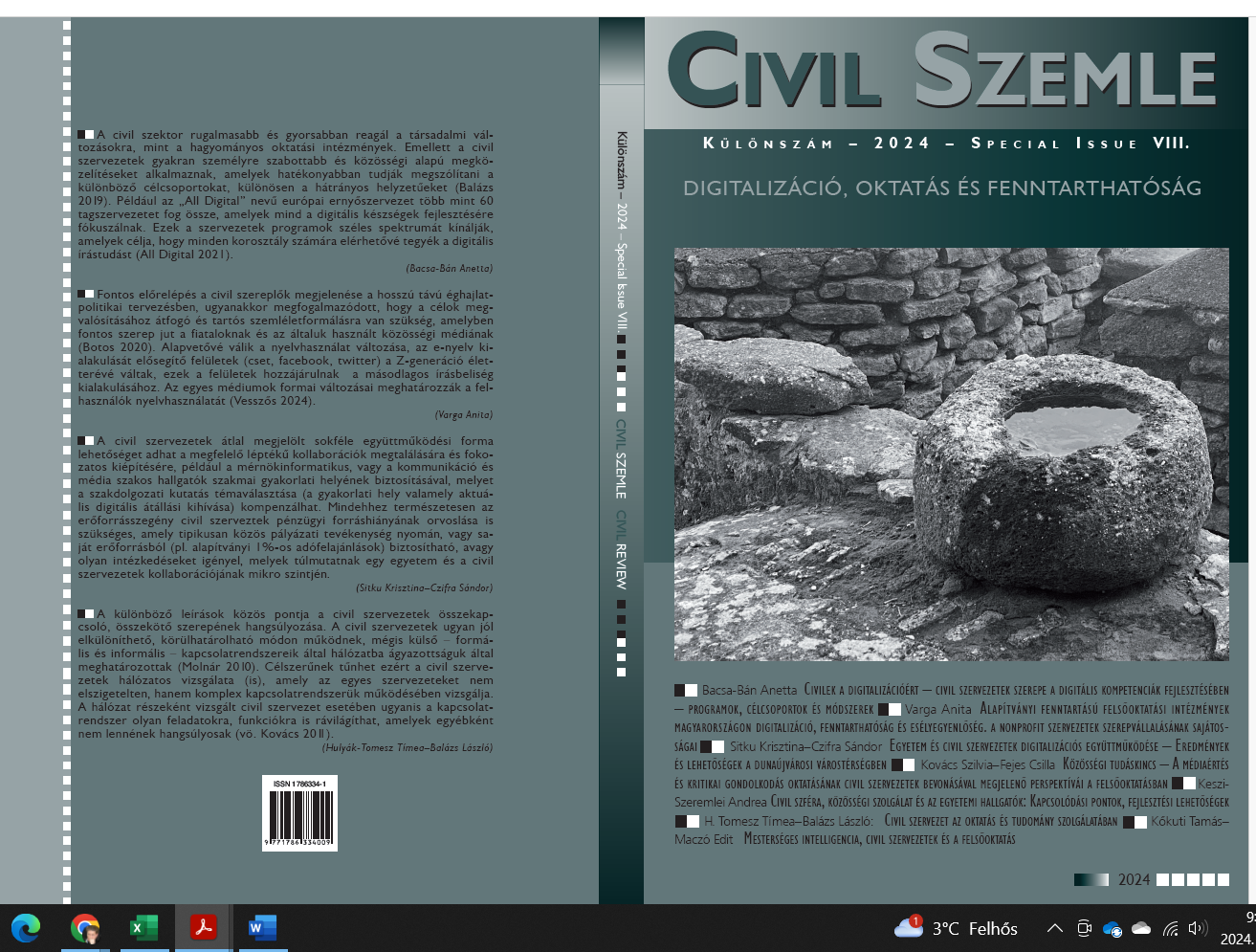Civil society, community service and university students
Connection points, future perspectives
Abstract
The study examines the relationship between civil organizations and higher education institutions, with particular regard to university students’ knowledge and commitment to the civil sphere, as well as its strengthening. The starting point of the research is that community service was introduced in public education in 2011. The aim of this step was, among other things, community service that can be performed at civil or non-profit organizations, whose principles of activity include the principle of independence from financial interests, as well as the principle of strengthening local communities. The activity performed by the student must be defined in such a way that the student can experience the joy of selfless helping and giving. Starting from this mandatory activity, the aim of the research is to map the level of knowledge university students have about the civil sphere, and how motivated they are to provide selfless, helpful support to civil organizations. In addition, it examines how attractive the graduate students find it to complete their professional practice in part or in whole at NGOs, as well as explore the motivations behind their decision. The study also formulates suggestions on how knowledge related to the civil sphere could be more effectively integrated into university education and what steps are necessary to establish closer cooperation with civil society organizations, which in the long term support and strengthen the activities of civil society organizations, as well as those entering the world of work. It also encourages students’ willingness to help selflessly, which is also essential in achieving the goals related to sustainability.
References
Americorps.gov: The Peace Corps, Volunteers in Service to America, The Youth Conservations Corps, AmeriCorps, National Senior Services Corps, Elérhető: https://americorps.gov/
Bodó M. (2014a): A közösségi szolgálat 2011-es bevezetése és tanulságai. Elérhető: https://www.oktatas.hu/pub-_bin/dload/kozoktatas/iskolai_kozossegi_szolgalat/szakirodalom/UPSZ_3-4_Bodo_PRINT.pdf (Letöltés dátuma: 2024. 11. 02.)
Bodó M. (2014b): Az iskolai közösségi szolgálat implementációja a nemzetközi tapasztaltok tükrében, Országos Közoktatási és Szakképzési Szakértői Konferencia, Elérhetőség: https://kiadvany.suliszerviz.com/kiadvanyok/12-kiadvany-2014/379-2014-dr-bodo-marton-az-iskolai-kozossegi-szolgalat-implementacioja-a-nemzetkozi-tapasztalatok-tukreben (Letöltés dátuma: 2024. 10. 30.)
Bodó M. (2024): Iskolai Közösségi Szolgálat gyakorlata a szerzetesi fenntartású gimnáziumokban II. A szerzetesi iskolák IKSZ-programjai 10 éves távlatban, Mester és Tanítvány, Új folyóirat II. 1. sz. – 2024., Elérhetőség: file:///C:/Users/keszia/Downloads/Mester_es_Tanitvany_3-49-61.pdf (Letöltés dátuma: 2024. 10. 30.)
Braun R. (2013): A vállalatok politikája, Vállalati, Társadalmi felelősségvállalás, Vállalati közösségek és a vállalati stratégia jövője, Vezetéstudomány, 2013. XLIV. évf. 1. sz. 18-28. Elérhető: https://unipub.lib.uni-corvinus.hu/1079/1/vt_2013n1p18.pdf (Letöltés dátuma: 2024. 11. 02.)
Czike Klára és Bartal Anna Mária (2004): Önkéntesek és nonprofit szervezetek – az önkéntes tevékenységet végzők motivációi és szervezeti típusok az önkéntesek foglalkoztatásában. Pázmány Péter Katolikus Egyetem, Piliscsaba
CSW: Cselekvő Wiki: Iskolai közösségi szolgálat, Elérhető: https://cskwiki.hu/iskolai-kozossegi-szolgalat-2/ (Letöltés dátuma: 2024. 10. 30.)
Fényes Hajnalka–Kiss Gabriella (2011): 2011 – az Önkéntesség Európai Éve: Az önkéntesség társadalmi jelensége és jelentősége. In: Debreceni Szemle, 19. 4. sz. 60-368.
Furco, Andrew (1996): „Service-learning: A Balanced Approach to Experiential Education.” Expanding Boundaries: Service and Learning. Washington DC.: Corporation for National Service. https://www.shsu.edu/academics/cce/documents/service_-learning_balanced_approach_to_experimental_education.pdf (Letöltés dátuma: 2024. 10. 30.)
Géring Zsuzsanna (2018): A vállalati társadalmi felelősségvállalás kritikai megközelítései, Replika, 106–107., (1–2.), pp. 56–76. DOI: https://doi.org/10.32564/106-107.4, Elérhetőség: https://real.mtak.hu/91150/1/replika_106-107-04_gering.pdf (Letöltés dátuma: 2024. 10. 29.)
ISO (2008): 26 000: Guidance on Social Responsibility, Tervezet, 2008. december, Elérhető: https://www.iso.org/iso-26000-social-responsibility.html (Letöltés dátuma: 2024. 10. 30.)
évi LXXXVIII. törvény a közérdekű önkéntes tevékenységről. Elérhető: https://njt.hu/jogszabaly/-88-00-00 (Letöltés dátuma: 2024. 10. 30)
Matolcsi Zsuzsa (2013): Az iskolai közösségi szolgálat bevezetése. Elérhető: https://epa.oszk.hu00-000/00035/00157/pdf/EPA00035_upsz_2013_03-04_074-080.pdf (Letöltés dátuma: 2024. 11. 02.)
Markovics Valéria (2020): Úton a felelős állampolgári lét felé. Az iskolai közösségi szolgálat közvetlen és közvetett hatásai. Oktatáskutatók Könyvtára, 10., Elérhető: https://mek.oszk.hu/21000/21006/21006.pdf (Letöltés dátuma: 2024. 10. 30.)
Nemzeti Önkéntes Stratégia 2011–2020 (2012): Letöltés: http://www.kormany.hu/download/4/98/-d0000/%C3%96nk%C3%A9ntes%20strat%C3%A9gia.pdf, (Letöltés dátuma: 2024. 10. 30.)
Oktatási Hivatal: Az iskolai közösségi szolgálat (IKSZ) fogalmai és alapelvei, Elérhető: https://www.oktatas.hu/kozneveles/iskolai_kozossegi_szolgalat/gyik (Letöltés dátuma: 2024. 10. 28)
Susánszky Éva–Székely András–Székely B. András–Módli Kata (2022): Fiatalok mentális egészségének megőrzése és javítása iskolai környvezetben – feltáró kvalitatív kutatás. Kapocs ¾. sz. (2022). Elérhetőség:
https://epa.oszk.hu/02900/02943/00090/pdf/EPA02943_kapocs_2022_3-4_099-107.pdf, (Letöltés dátuma: 2024. 10. 30.)



